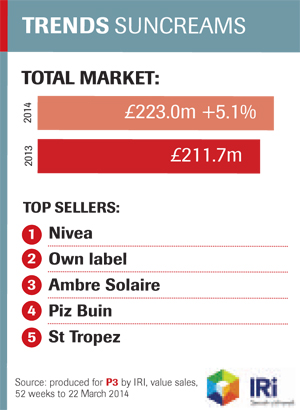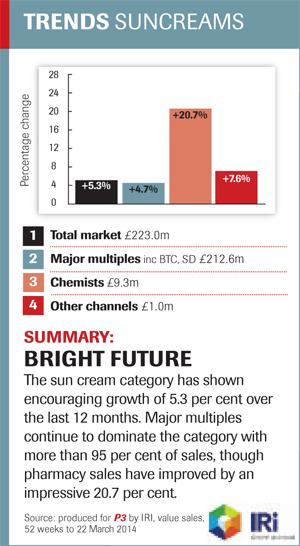For healthier Holidays
In Seasonal
Follow this topic
Bookmark
Record learning outcomes
A pre-travel consultation at the local pharmacy can ensure that customers are well prepared and reduces the risk of ill health spoiling their expensive summer trip
Some of your customers might be lucky enough to be heading off to Brazil for the 2014 Fifa World Cup this summer, while others may be jetting off to Vietnam, Mexico or Cuba, three fast- growing long-haul destinations, according to Kuoni. But whether it's an exotic long-haul trip, a fortnight in Spain or a week in Devon, all your holiday-bound customers will welcome some expert advice on how to stay healthy on holiday and prepare for their trip. Holidays are exciting, but illness, an accident or even a tummy upset can spoil a trip for everyone.
Help customers prepare for travel
Some pharmacies offer a full travel clinic service, but most don't. However, there is still plenty staff can do to help customers prepare for their trip.
'It's important for staff to ask questions about where customers are travelling and any medical conditions they have. Also ask about any allergies and what effect travel could have on these. Customers who are at risk of DVT may benefit from taking aspirin, but check this is suitable for them first,' says Leyla Hannbeck, head of pharmacy at the NPA.
'When travelling abroad, it's vital that those with existing medical conditions seek advice. How will their condition be affected by foreign travel? Customers must also ensure that any travel medicines such as anti-diarrhoeals or antihistamines don't interact with current medication,' says Michael Stewart, information pharmacist at Numark.
There are also rules and regulations to contend with. 'Taking prescription medicine abroad needs careful planning because many countries won't allow certain medicines to be imported. Patients should check with the embassy of the country for a list of medicines not permitted.' If a customer's medicine is listed, they'll need to carry a copy of their prescription and a letter from their GP with details of the medication and condition it is prescribed for.
'It's also vital that medicines and any medical equipment such as syringes are in their original packaging, correctly labelled and are carried as hand luggage at all times,' says Kajal Ruda, All About Health pharmacist at AAH.
Take the opportunity to discuss travel vaccines, malaria prophylaxis, food and water hygiene, rehydration salts, sun protection, DVT prevention and first aid. 'You can raise awareness of DVT and its symptoms through customer engagement and advise where necessary, for example if a customer has had a major operation, is pregnant, has suffered with DVT or is taking oral contraceptives or HRT,' says Mr Ruda.
When a customer thinks about stocking up for their holidays, they'll generally think about swimwear, sun cream, insect repellent and grooming. However, it's vital for pharmacists to make the most of this opportunity to ensure that all their customers' travel requirements are considered. Pharmacy is best placed to help with products and advice,' says Mr Stewart.
One-stop travel clinics
'More people are taking long-haul holidays and if you have a number of customers in your area who do this then it's worth considering offering a travel clinic service,' says Ms Hannbeck. Two pharmacies that do this tell P3 about their experiences.
Rohpharm Pharmacy, Plaistow and Ilford Rohpharm
Pharmacy, in London, offers a travel health clinic at both its branches. Customers are charged a £20 fee, which is refundable against purchase of vaccines and anti-malarials.
 'We've been running the service for three years. We don't just give vaccines, we offer a full travel health consultation service,' says superintendent pharmacist Rohit Patel. 'Our travel clinic is very popular and we get four to five customers every day, all year round. They like our convenient opening hours and the fact they don't have to make an appointment. We also stock more vaccines than many GP surgeries.'
'We've been running the service for three years. We don't just give vaccines, we offer a full travel health consultation service,' says superintendent pharmacist Rohit Patel. 'Our travel clinic is very popular and we get four to five customers every day, all year round. They like our convenient opening hours and the fact they don't have to make an appointment. We also stock more vaccines than many GP surgeries.'
The most popular vaccines are meningitis, yellow fever, typhoid and hepatitis B.
'We find that customers who use our travel clinic will also pick up OTC holiday health items while they're here.'
Ross Pharmacy (Numark), Northwood
Ross Pharmacy set up a travel clinic last summer, using a training bursary provided by Numark to access its Pharmadoctor training.
'The service has proved very popular. We have advertised locally and made surgeries aware we offer this service. We offer booked and walk-in appointments,' says pharmacist Jane Patel, who runs the clinic. 'Appointments aren't always available for travel vaccines at GP surgeries and many people book holidays last minute. Pharmacies are more accessible and open longer hours. Each patient is fully risk assessed and receives a full consultation.'
The most popular vaccines are hepatitis A, typhoid and tetanus/diphtheria/polio.
'We truly enjoy counselling travellers, discussing their trip and educating them on travel health. Travellers are thrilled to receive a thorough, relaxed and informal service,' says Ms Patel. It's also had a positive effect on link sales such as mosquito nets and travel first aid kits.
Build the travel health category
To make the most of your travel health category, you need to ensure staff are able to confidently advise customers on common ailments while travelling. 'Advice should not just be centred on selling product, but encompass how to avoid getting ill in the first place and managing it while away,' says Mr Stewart.

'Create an impactful travel fixture, preferably a gondola end that can be viewed through the window. Display sunscreens on the top shelves, then insect repellents and first aid followed by travel health medicines. This will create link purchases and make customers think about what other products they should be taking.'
Stocking a branded product is vital for category navigation, says Mr Stewart, but don't forget own label too. Numark's own brand travel products saw a 38 per cent sales increase this year. 'Create an environment that encourages link selling from the fixture, but don't assume that because a customer has chosen a product that it's the right one for them.'
If you offer a travel clinic, ensure that you market it effectively, so that customers are aware of the service that you are offering. Remember that word of mouth is a useful tool. 'As well as using your window and gondolas, market direct to local business,' says Mr Stewart.
'Having good adjacencies also helps. Having sun creams and insect repellent occupying neighbouring shelf space, for example, will help the customer to purchase all they need before travelling,' says Mr Ruda.
Top long-haul destinations from the UK
According to Kuoni's Travel Edit 2014, the top 10 long haul destinations for 2014 to which your customers may be heading are:
- The Maldives
- Thailand
- Sri Lanka
- United Arab Emirates
- USA
- Mauritius
- Malaysia
- Cuba
- Antigua
- Singapore
First aid essentials
Help customers prepare for the unexpected by putting together a travel first aid kit, suggesting that they include:
- Sunscreen SPF15+
- Insect repellent Antihistamine cream
- Analgesics
- Plasters
- Gauze dressing and adhesive tape
- Rehydration sachets
- After sun lotion
- An anti-diarrhoeal
- Condoms
Sun protection update
A warm summer last year helped to grow the suncare market by around four per cent, according to Mintel, and it's predicted to continue growing by one to three per cent annually over the coming five years. 'However, in order to see continued growth, driving consumption is essential. A low awareness of how much sun protection to apply to different parts of the body as well as a low number of people reapplying sun protection offer opportunities for the category to drive the frequency of usage,' says Roshida Khanom, Mintel analyst.
Use of suncare products rose in 2013, but the over 55s remain the lowest users, with 22 per cent not having used sunscreen in the past 12 months. The category remains confusing to some: only one-third have a good understanding of how much sun protection to apply, and men and young people have the least confidence.
Comment
 Lila Thakerar, Shaftesbury Pharmacy, Harrow 'Link selling is the most beneficial aspect of summer travel. When a customer mentions that they are travelling in the summer, this is the opportunity to recommend products such as sun creams, diarrhoea medications, malaria prophylaxis and antihistamines. Of course, summer travel usually involves exposure to the sun, and sunscreens and insect repellents are most popular in terms of sales. Having adequate stock levels of all summer products is crucial for a pharmacy, and it's important that staff are well trained for customers to have faith in the advice they are given. An opportunity is to work in association with the local surgeries, so that referrals are made to the pharmacy from the travel vaccination clinic.'
Lila Thakerar, Shaftesbury Pharmacy, Harrow 'Link selling is the most beneficial aspect of summer travel. When a customer mentions that they are travelling in the summer, this is the opportunity to recommend products such as sun creams, diarrhoea medications, malaria prophylaxis and antihistamines. Of course, summer travel usually involves exposure to the sun, and sunscreens and insect repellents are most popular in terms of sales. Having adequate stock levels of all summer products is crucial for a pharmacy, and it's important that staff are well trained for customers to have faith in the advice they are given. An opportunity is to work in association with the local surgeries, so that referrals are made to the pharmacy from the travel vaccination clinic.'
 Dilip Patel, Mirage Pharmacy, Handsworth, Birmingham 'Summer travel is an important category for us and we offer all sorts of advice about anti- malarials and vaccinations. At this time of year we concentrate our staff training on allergies, hayfever and travel. Over-the- counter sales could be improved by advertising the travel services available at the local pharmacy. Staff knowledge and having a good range of products available tend to be important factors. Customers are more knowledgeable these days because they have the internet at their finger tips, so it's very important that staff and pharmacists are highly trained. I'd love to run a travel clinic with a full range of services and vaccinations, but a lack of space for this has always been a problem.'
Dilip Patel, Mirage Pharmacy, Handsworth, Birmingham 'Summer travel is an important category for us and we offer all sorts of advice about anti- malarials and vaccinations. At this time of year we concentrate our staff training on allergies, hayfever and travel. Over-the- counter sales could be improved by advertising the travel services available at the local pharmacy. Staff knowledge and having a good range of products available tend to be important factors. Customers are more knowledgeable these days because they have the internet at their finger tips, so it's very important that staff and pharmacists are highly trained. I'd love to run a travel clinic with a full range of services and vaccinations, but a lack of space for this has always been a problem.'
 Alan Bradley, Cornwell's Chemist, Stoke-on-Trent 'While the products in this category don't tend to vary much from year to year, the information and knowledge regarding safe travel during the summer period does. It's important that we always offer health advice for travelling abroad, on being in the sun and protecting skin and eyes and insect repellants, etc. I believe that the public look to pharmacy more than any other resource for advice and guidance on skin protection in the sun and do listen to the advice we give. As a result, I feel that we should do the most we can to ensure we offer affordable sun creams which appeal to the public, such as the spray on products and long-lasting sun blocks tend to appeal to parents, and I will not sell creams with an SPF less than 20.'
Alan Bradley, Cornwell's Chemist, Stoke-on-Trent 'While the products in this category don't tend to vary much from year to year, the information and knowledge regarding safe travel during the summer period does. It's important that we always offer health advice for travelling abroad, on being in the sun and protecting skin and eyes and insect repellants, etc. I believe that the public look to pharmacy more than any other resource for advice and guidance on skin protection in the sun and do listen to the advice we give. As a result, I feel that we should do the most we can to ensure we offer affordable sun creams which appeal to the public, such as the spray on products and long-lasting sun blocks tend to appeal to parents, and I will not sell creams with an SPF less than 20.'

